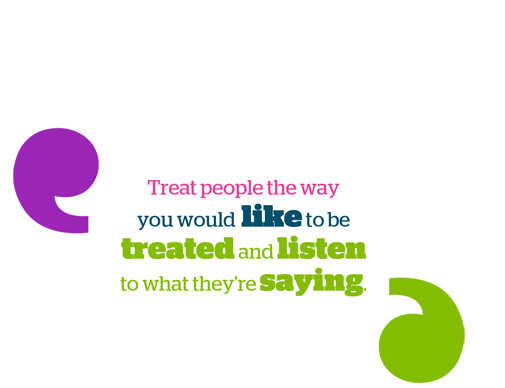"I try to treat people I cross paths with in the same way I would like to be treated."
You can have all sorts of different relationships that can be fulfilling and rewarding, for example with friends, parents, families, neighbours and teachers. However, relationships aren’t always easy and you might have problems sometimes. Just remember to keep talking to each other. Talking and communicating helps in many ways.
Friends are very important to young people. They are good for mental health, well-being and self-confidence. It’s hard when you argue, and you can feel confused and upset. It’s better to have a few friends who want the best for you than lots of friends who try and make you do things you don’t want to do.
Many young people think that having a boyfriend or girlfriend is the most important relationship - but don’t feel you have to just because your friends are, or do anything you’re not ready for.
"Similarly you may feel put under pressure to be in a relationship which may even include a forced marriage."
-
To have good relationships with people, you need to talk about how you’re feeling.
-
Treat people the way you’d like to be treated and listen to what they’re saying.
-
If you’re having problems with your parents or carer, talk to someone outside the family who you trust, like a friend or teacher.
Grooming is when someone builds an emotional connection with a child to gain their trust for the purposes of sexual abuse or exploitation.
Sometimes people are not who we think, or want us to think they are. Paedophile networks groom young people, by making them believe they are their friends. They have sophisticated tactics. They befriend young people, giving them gifts, money, drugs and alcohol and use violence and intimidation to control them, subjecting them to abuse.
Children and young people can be groomed online or in the real world, by a stranger or by someone they know - for example a family member, friend or professional. Groomers may be male or female. They could be any age. They are not your friends and you must speak out as soon as you can, before things get any worse.
Sometimes young people can be radicalised into changing their beliefs and groomed by extremists to commit crimes and get involved in terrorist activity.
Sexting is the sending and receiving
of naked pictures, 'underwear shots',
sexual or 'dirty pics' or rude text
messages or videos. This can be via
mobile phones, social networks,
emails or social apps.
Most mobile phones and tablets have
built in cameras and most are linked
up to email and social network
accounts.
"Police have warned of the
dangers sexting can have
including loss of control and
leaving young people at the risk of
being exploited by paedophiles
and sexual predators."
Many young people feel under
pressure to send nude or sexual
photos of themselves, or let others
take photos because their boyfriend
or girlfriend said “if you loved me
you would do this” reassuring them
that no one else would see this
picture. Photos like these are often
not respected and can be posted as
revenge or shown around carelessly
to anyone else. Once someone hits
send, they have ultimately lost
control of that picture and where it
may end up. Each action online
leaves a digital footprint and
everything anyone does online is
out there in cyberspace even if you
think something has been deleted.
"You do not have to feel forced
into doing anything you are not
comfortable with."
Talk to someone you trust if you feel
pressured. Any incidents of bullying
are unacceptable no matter where
they are and should not be tolerated.
Do not dismiss sexist language or
behaviour as funny.
Some people feel a need to gain
attention and notoriety from the
sexting which can often be a result
of insecurity or a lack of confidence.
Is sexting legal?
The law is quite clear on sexting. It is
illegal to take, possess or share
'indecent images’ of anyone under 18
even if you're the person in the
picture. If you are under the age of 18,
the law sees you as a child. Therefore,
if you have any indecent images or
videos of somebody who is under 18
you would technically be in
possession of an indecent image of a
child - even if you are the same age.






